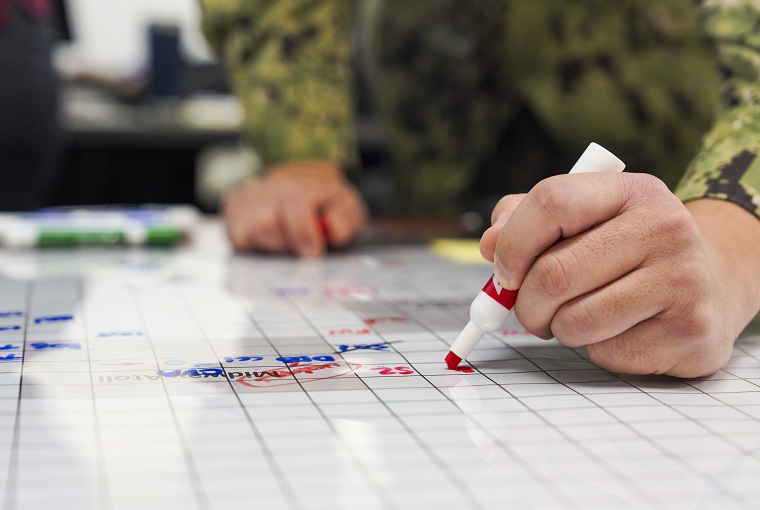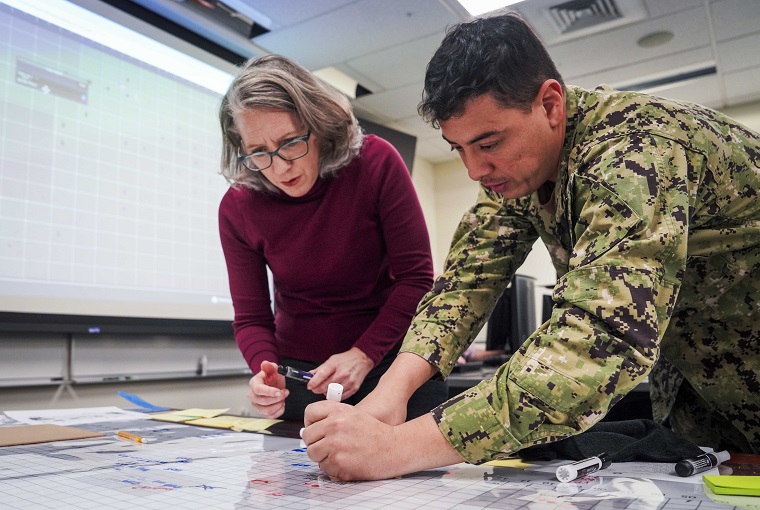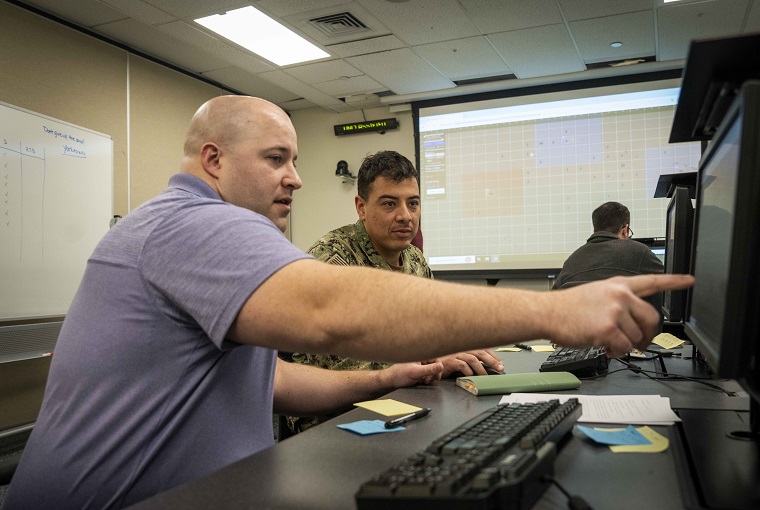DOD Leaders Complete Naval War College Course in Wargaming Design

Newport, R.I. - The U.S. Naval War College (NWC) Wargaming department (WGD) hosted the 13th iteration of its “Wargaming 101” introductory course, onboard Naval Station Newport, Jan. 7-16.
The spring 2025 session of Wargaming 101 welcomed 42 participants from 20 different Department of Defense (DoD) and U.S. government organizations, offering them insights into the methods and processes used by NWC to design, develop, execute and analyze wargames in support of Navy and DoD strategic priorities.
Jonathan Compton, WGD chair, offered that wargaming is an essential part of NWC’s research and educational missions.
“From an educational perspective, wargaming is a key part of our Joint Military Operations department’s operational art curriculum, used to reinforce learning of operational factors and functions,” Compton stated. “From a research perspective, the processes presented in this course are our method when creating analytic war games as directed by the Chief of Naval Operations.”

Course participants included personnel from the Office of the Chief of Naval Operations (OPNAV), U.S. Transportation Command (USTRANSCOM), U.S. Strategic Command (USSTRATCOM), U.S. Space Command (USSPACECOM), U.S. Special Operations Command (USSCOM), U.S. Fleet Forces Command (USFF), Military Sealift Command (MSC), U.S. Naval Surface Warfare Center Philadelphia Division, U.S. Marine Corps Warfighting Laboratory (MCWL), Chief of Staff of the Air Force (CSAF) Strategic Studies Group, U.S. Marine Corps Tactical Training Exercise Group, Naval Sea Systems Command (NSSC), Joint Enabling Capabilities Command (JECC) and more.
Originally designed as a training medium for incoming faculty and staff, Wargaming 101 was reorganized to incorporate external organizations recognizing wargaming as a useful tool for analysis of national security issues.
Today, the course offers value to a wide range of wargaming creators, contributors, and consumers through lectures, problem-solving activities, and relationship-building opportunities.
“It’s great to welcome folks from a wide variety of mostly DoD organizations, learn the wargaming techniques they use, and share our approach to wargaming,” said Shawn Burns , Ed.D., Wargaming 101 course director and NWC professor. “Our 15 faculty course presenters are all experienced wargamers who try to make the course fun with lots of practical application group activities to reinforce the ideas presented by lecture.”
Burns also added that, after course completion, these presenters operate as a “reach-back” resource for course graduates.
Mary Hossier, director of innovation, CSAF Strategic Studies Group, attended the course in order to develop talent management wargaming for the Air Force. The course’s focus on creative thinking as a core element of warfighting success provided her team with the foundational tools to move forward this spring.

“Focusing on creativity and driving humans to key decision points through wargaming cultivate creativity, which is a woefully undervalued strategic virtue,” Hossier asserted. “Our adversaries have learned how to exploit our processes and approaches. So we have to get creative and disruptive to leverage our strongest bet: the ingenuity, creativity, and innovation of the American warfighter.”
Another course attendee, Lt. Col. Mike Seminelli, data scientist, USSPACECOM, also shared how the course would help him in his current assignment.
“I'm excited to leverage my newly acquired skills to design cutting-edge wargames that confront the toughest challenges in integrating space power into joint military operations, ultimately enhancing our nation's warfighting effectiveness,” Seminelli said.
Wargaming has been integral to NWC since 1887. While the tools and technology used in simulations have evolved over the past century, the value of wargaming in maritime leadership development remains strong. Today, NWC conducts more than 50 gaming events per year, ranging in variety from complex, multi-sided computer-assisted games to simple, single-sided seminar games.
As a critical component of the Navy's Analytic Master Plan (AMP), NWC is designated by the CNO as the Navy's pillar lead for wargaming, leading the Navy's wargaming efforts, integrating research across the naval wargaming enterprise and promoting the dissemination of findings within the naval analytic community. These efforts support the CNO's Navigation Plan 2024 (NAVPLAN 2024) by investing in warfighter competency and resourcing fleet staffs with trained personnel ready to fight from the maritime operations center (MOC).
Established in 1884, NWC is the oldest institution of its kind in the world. The college delivers excellence in education, research, and outreach, informing today’s decision makers, educating tomorrow’s leaders, and engaging partners and allies on all matters of naval power in order to preserve the peace, respond in crisis, and win decisively in war.
